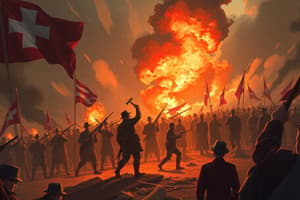Podcast
Questions and Answers
What was the term used to refer to World War I?
What was the term used to refer to World War I?
- The Great Conflict
- The Great War (correct)
- The World War
- The Global Battle
Which countries formed the Triple Alliance?
Which countries formed the Triple Alliance?
- Germany, Austria-Hungary, and Italy (correct)
- Germany, Britain, and France
- Italy, France, and Russia
- Britain, France, and Russia
What was one of the immediate causes of World War I?
What was one of the immediate causes of World War I?
- Rise of nationalism
- Tensions between countries (correct)
- Industrial Revolution
- Colonial competition
What feeling did nationalism evoke in the countries of Europe prior to World War I?
What feeling did nationalism evoke in the countries of Europe prior to World War I?
Which of the following was NOT a member of the Triple Entente?
Which of the following was NOT a member of the Triple Entente?
How did alliances contribute to the outbreak of war?
How did alliances contribute to the outbreak of war?
What effect did industrial economies have on militaries prior to the war?
What effect did industrial economies have on militaries prior to the war?
What is nationalism defined as?
What is nationalism defined as?
What was a significant consequence of the alliances formed before World War I?
What was a significant consequence of the alliances formed before World War I?
What was the outcome of the competition between the Triple Alliance and the Triple Entente?
What was the outcome of the competition between the Triple Alliance and the Triple Entente?
Flashcards are hidden until you start studying
Study Notes
Long-term Causes of World War I
- Tensions in Europe had been escalating for years prior to 1914, creating an environment ripe for conflict.
- Nationalism was a powerful force, uniting people within nations and fostering pride, but also leading to competitive rivalries.
- Countries built up large armies and navies, viewing military strength as a demonstration of national superiority.
- Major alliances formed:
- The Triple Alliance included Germany, Austria-Hungary, and Italy.
- The Triple Entente consisted of Britain, France, and Russia.
- Diplomatic tensions heightened as any conflict could trigger involvement from allied nations, potentially leading to a larger war.
Industrial Revolution and Competition
- The Industrial Revolution began in Britain in the late 18th century, positioning it as the leading industrial power.
- By 1914, Germany had overtaken Britain in the production of coal, iron, steel, and cars, intensifying economic competition.
- Increased production capacity allowed factories to manufacture weapons more quickly and effectively, fostering an arms race.
Immediate Causes
- Specific incidents, known as "triggers," ignited the long-standing tensions, leading to the outbreak of war.
- The alliances formed between nations transformed local conflicts into a global war as nations honored their commitments to support allies.
Impact of the War
- World War I resulted in over 15 million deaths and more than 20 million injuries, shocking the global community.
- Initially known as 'the Great War,' it was a defining moment in history that influenced international relations and conflicts for years to come.
Studying That Suits You
Use AI to generate personalized quizzes and flashcards to suit your learning preferences.




